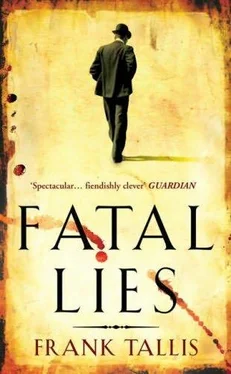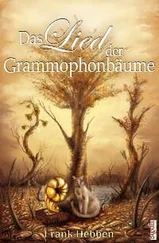Frank Tallis - Fatal Lies
Здесь есть возможность читать онлайн «Frank Tallis - Fatal Lies» весь текст электронной книги совершенно бесплатно (целиком полную версию без сокращений). В некоторых случаях можно слушать аудио, скачать через торрент в формате fb2 и присутствует краткое содержание. Жанр: Исторический детектив, на английском языке. Описание произведения, (предисловие) а так же отзывы посетителей доступны на портале библиотеки ЛибКат.
- Название:Fatal Lies
- Автор:
- Жанр:
- Год:неизвестен
- ISBN:нет данных
- Рейтинг книги:3 / 5. Голосов: 1
-
Избранное:Добавить в избранное
- Отзывы:
-
Ваша оценка:
- 60
- 1
- 2
- 3
- 4
- 5
Fatal Lies: краткое содержание, описание и аннотация
Предлагаем к чтению аннотацию, описание, краткое содержание или предисловие (зависит от того, что написал сам автор книги «Fatal Lies»). Если вы не нашли необходимую информацию о книге — напишите в комментариях, мы постараемся отыскать её.
Fatal Lies — читать онлайн бесплатно полную книгу (весь текст) целиком
Ниже представлен текст книги, разбитый по страницам. Система сохранения места последней прочитанной страницы, позволяет с удобством читать онлайн бесплатно книгу «Fatal Lies», без необходимости каждый раз заново искать на чём Вы остановились. Поставьте закладку, и сможете в любой момент перейти на страницу, на которой закончили чтение.
Интервал:
Закладка:
Trezska completed her recital with a less dramatic piece: Tartini's Pastorale for violin in scordatura. Gradually, its gentle rusticity and bucolic breeziness dispelled the stench of brimstone, and visions of eternal torment were replaced by idyllic vales, drones, pipes, and slumbering shepherds.
When the final notes had faded and Trezska had removed the violin from beneath her chin, the audience responded with noisy delight. Several of the dignitaries in the front row jumped to their feet-and others seated behind copied them, clapping and cheering. Through the mass of bodies, Liebermann caught a glimpse of white and gold- and saw Trezska bend to take the bunch of flowers from the Austrian general.
After collecting his coat from the cloakroom, Liebermann left the hall and set off toward the Ringstrasse. He passed a Bosnian hawker, in crimson fez and pointed slippers, who attempted to sell him a kettle and an inlaid snuffbox. The sound of Tartini's diabolical trills still persisted in the young doctor's mind. They had acquired a siren-like quality, exerting a subtle tractive power that slowed his step. Moreover, he had begun to question the propriety of his precipitate departure. Trezska Novak had sent him a personal invitation. Surely it was discourteous to leave without congratulating her. This simple point of etiquette was frequently observed in musical circles, was it not? Such were his justifications.
Liebermann stopped, turned around, and made his way back to the concert hall, slipping down a side alley that led to the artists’ entrance. He rapped on the door, which was opened by a porter. Jangling some loose change in his pocket, he asked the functionary to convey his compliments to Fraulein Novak. Some silver coins changed hands and the porter disappeared. A few minutes later the door reopened and Liebermann was admitted into a narrow corridor. A few gentlemen were standing at the far end: one of them was Bertalan Szep. He was smoking a cigar, and his arm was casually slung around the shoulders of his cello case. The porter indicated Trezska's dressing room.
A gentle tap on the paneling produced an invitation to enter.
Trezska was seated in front of a large mirror.
“How good of you to come.”
“It was my pleasure.”
She did not stand to greet her visitor but remained perfectly still, conversing with Liebermann's reflection.
“I like to sit quietly after a concert.” She smiled softly. “I find it… necessary.”
“Yes. One needs to recover after expending so much emotional energy-and the pieces looked physically taxing, too. It was a very impressive performance: I have never heard the great G-minor sonata played unaccompanied before.”
Something like a shadow passed across Trezska's face. “I was pleased-although some would say that I took liberties with the andante… and the allegro was somewhat uninspired, don't you think?”
Liebermann understood that a musician of her quality was not seeking a blithe denial.
“The problem lies-at least in part-with the composition itself. The allegro is musically inferior. Even so… I enjoyed it immensely.”
“You are fond of music,” said Trezska, her gaze becoming more penetrating. “I was right-wasn't I?”
“Yes.”
“What is your instrument?”
“The piano.”
Trezska looked satisfied, almost smug, and without uttering a single word managed to communicate something like: Yes, of course you're a pianist-how could you be anything else?”
Now that he was close to her, Liebermann noticed that Trezska's cheek was still a little swollen. She had used make-up to disguise her injury.
“How is your graze?”
“Sore… but getting better.”
“Good.”
There was a knock on the door, followed by the appearance of Szep. He acknowledged Liebermann with a bow, and said to Trezska: “We are off to Csarda… Kiss is coming. Count Dohnanyi and his guest will be joining us later.”
Liebermann noticed that Trezska's eyes flicked toward the bunch of flowers she had been given, now laid on top of her dressing table.
She shook her head.
“I'm going home,” said Trezska. “Tell Kiss to get me a cab.”
“Going home?” said Szep, evidently surprised.
Trezska touched her head. The gesture was languid and affected, like that of an operatic diva.
“A headache,” she said, with unconvincing indifference. “Please tell the count that I am sorry-I know he will be disappointed.”
“Very well,” said Szep. He shrugged, and left the room.
Trezska's gaze met with Liebermann's reflection again, and her cunning smile invited him to acknowledge the insincerity of her exchange with Szep. She stood up, her dress rustling, and turned to face him. For the first time that evening they looked at each other directly. Her expression changed, switching from mischievous complicity to something more serious. Liebermann stepped forward and took her hand in his. He kissed her long delicate fingers, on which he detected the distinctive fragrance of her perfume: the clementine was particularly sweet.
“Forgive my presumption, but I would…” Liebermann hesitated before continuing his sentence. “I would very much like to see you again.”
32
“Whereare you taking me?”
Wolf punched Perger as hard as he could. His knuckles sank into the soft area of the lower back, just to the right of the spinal column. The boy cried out in agony-and Wolf punched him again. The force of the second blow pushed the boy forward, and he fell to his knees. Wolf's hand closed around his victim's mouth.
“Just shut up! Not another sound. Ask me again-and I swear I'll… I'll…” Nothing came to mind, and once again Wolf resorted to violence. He brought his knee up into the space between Perger's shoulder blades, which produced simultaneously a sharp crack and a sickening dull thud.
“Now get up!” Wolf grabbed Perger's collar and pulled him to his feet. “And keep going.”
They followed the landing until they reached the pitch-black space beneath an ascending staircase. Wolf pushed Perger away and crouched down, feeling for the ridge of the trapdoor.
“Wait here. If you try to run away you'll regret it. Do you understand?” Perger didn't reply. “Do you understand?” repeated Wolf, emphatically.
“Y-y-yes,” stuttered Perger.
Wolf lowered himself into the lost room, lit the paraffin lamp, and hung it on the nearest beam.
“Perger?”
A terrified face appeared in the square aperture.
“Get down here-No. Not like that, you fool. Sit on the edge and push yourself off.”
The younger boy dropped onto the crate but immediately lost his balance and toppled off. He did not attempt to get up but remained very still, sprawled out on the floor.
“You clumsy idiot.”
Wolf trod on Pergers buttocks, using the springiness of the flesh to add lift to his step. He got back onto the crate, reached upward, and pulled the trapdoor closed.
“Now… get up.”
Perger tried to stand, but before he could get to his feet, Wolf jumped off the crate and delivered a kick to his ribs. Perger rolled over, groaning.
“I said, get up.”
Perger looked at his tormentor, his eyes wide with fear.
“W-W-Wolf… I can't get up. I c-c-can't-not if you won't let me.”
“I swear to God, Perger…”
The boy scrambled to his feet while Wolf strolled over to the suitcase and rummaged through the contents. He returned, smoking a cigarette.
“Stand beneath the lamp.”
The boy obeyed, and Wolf slumped back in the old wicker chair. He said nothing, but simply watched-and smoked. The thin line of his mouth and the enamel glaze of his stare betrayed no emotion. Only the sound of Perger's heavy breathing broke the cruel and protracted silence.
Читать дальшеИнтервал:
Закладка:
Похожие книги на «Fatal Lies»
Представляем Вашему вниманию похожие книги на «Fatal Lies» списком для выбора. Мы отобрали схожую по названию и смыслу литературу в надежде предоставить читателям больше вариантов отыскать новые, интересные, ещё непрочитанные произведения.
Обсуждение, отзывы о книге «Fatal Lies» и просто собственные мнения читателей. Оставьте ваши комментарии, напишите, что Вы думаете о произведении, его смысле или главных героях. Укажите что конкретно понравилось, а что нет, и почему Вы так считаете.












